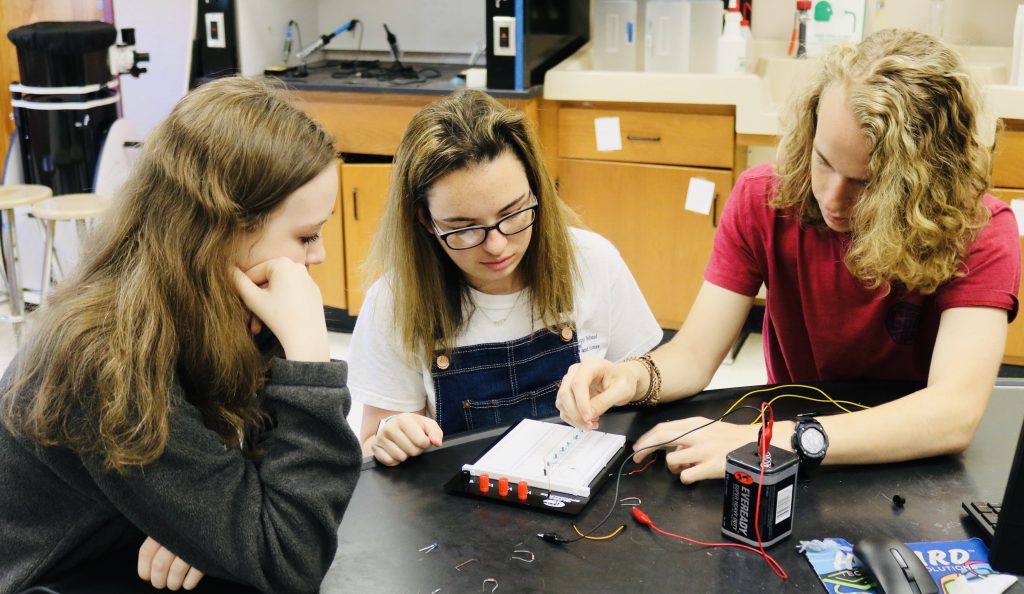Physics
Students attending MSMS have more opportunities to take and experience physics coursework than any other high school in the state. Physics courses at MSMS are heavily laboratory-based with lab time comprising 33% of all the core physics courses.
Requirements for graduation
All students must complete one of the two combinations for 1 full Carnegie Unit:
- SC 331 – Mechanics and SC 332 – Waves & Electricity OR
- SC 337 – AP Physics C Mechanics and SC 338 – AP Physics C E&M.

Requirements for graduation with a concentration in physics
The Concentration in Physics is designed for students who pursue an advanced plan of study in physics while attending MSMS. The Concentration in Physics at MSMS helps colleges identify MSMS graduates with advanced preparation in physics and who might benefit from placement in higher level coursework at the college level. Students who shall have completed 2.5approved physics Carnegie Units in physics with a minimum B-average in each course or higher while attending MSMS shall qualify. The Physics Department and Director for Academic Affairs shall determine which courses meet approval. The Concentration in Physics is awarded to qualified students whose applications are approved by the Director for Academic Affairs. The approved courses for the Concentration in Physics shall include:
- 1.0 Carnegie Unit SC337 AP Physics-C Mechanics and SC 338 AP Physics-C E&M
- 0.5 Carnegie Unit SC 434 Fluids, Thermodynamics and Optics
- Additional 1.0 CU’s (two semesters) which may include Modern Physics (SC339), Electronics (SC345), Adv. Problems in Calc-based Physics (SC333) or Special Topics in Physics (SC346).
Other course work may not be substituted.
Courses offered
Mechanics is an algebra and trigonometry-based course which provides a college level introduction to the principles of Newtonian mechanics. The course is designed to be equivalent to a university’s first semester of introductory algebra-based physics. Successful completion of this course will provide the student with a solid foundation in the topics of kinematics, work, energy, momentum, and power. Critical thinking and reasoning skills are developed through inquiry-based laboratory experiences and an emphasis on conceptual understanding.
Waves and Electricity is an algebra and trigonometry based course which provides a college level introduction wave motion, sound and an introduction to the principles of classical electricity and DC circuits. Critical thinking and reasoning skills are developed through inquiry-based laboratory experiences.
This course will provide an immersion into advanced computational topics of 1st year calculus-based physics courses. The course is offered each Spring semester. The student must have completed AP-C Mechanics and must be enrolled into AP-C E&M (or have already completed it).
The course provides students with a calculus-based introduction to the principles of classical mechanics. Topics include kinematics, Newton’s Laws, collisions and conservation laws, work and energy, rotational motion, statics, harmonic motion, universal gravitation, and other topics as well. Critical thinking and reasoning skills are developed through inquiry-based laboratory experiences.
The course provides students with a calculus-based introduction to the principles of classical electricity and magnetism. Both differential and integral calculus concepts will be utilized throughout the course. The major laws of electromagnetic theory are developed, including Coulomb’s Law, Gauss’ Law, Ampere’s Law, the Biot-Savart Law, and Faraday’s Law, ultimately leading to Maxwell’s Equations. Critical thinking and reasoning skills are developed through inquiry-based laboratory experiences.
This algebra and trigonometry-based course provides the student with an introduction to fluid mechanics, thermodynamic principles and simple optical instruments. Successful completion of this course will provide the student with a solid foundation in the topics of fluid statics and dynamics, thermodynamics, kinetic theory, PV diagrams and probability, and light reflection/refraction. Critical thinking and reasoning skills are developed through inquiry-based laboratory experiences. This course may be taken concurrently with Waves & Electricity or AP-C E&M (or after completing them).
This algebra and trigonometry-based course provides the student with a solid foundation in the topics of special relativity, electromagnetic waves, physical optics and radiometry, introductory atomic theory, radioactivity and nuclear physics. Critical thinking and reasoning skills are developed through inquiry-based laboratory experiences.
The class will introduce the Earth & Moon system, the sky and seasons, the origin of the Solar System, comparative planetology in our Solar System, the varieties of stars and galaxies in the universe, and the life cycle of stars from their formation to destruction. Quantitative topics will include basic physics of orbital mechanics, gravitational forces/acceleration, conservation of momentum, and conservation of energy. The lab component of this course will focus on small group projects and astronomy research. Some nighttime viewing may be required.
This course is offered to allow students an opportunity to develop expertise in the area of electronics. Assignments will be made from both text and laboratory designs. Students can gain familiarity with basic DC and AC circuits, measuring voltage/current/resistance, measuring AC signals, assessing complex impedance, designing simple antennas, and other introductory electrical engineering practices. A major part of the grade will be a final project.
This course is designed to give the student an opportunity for individualized learning in physics. The student will select faculty advisors and with their help, choose a particular physics problem of interest and pursue the problem.
